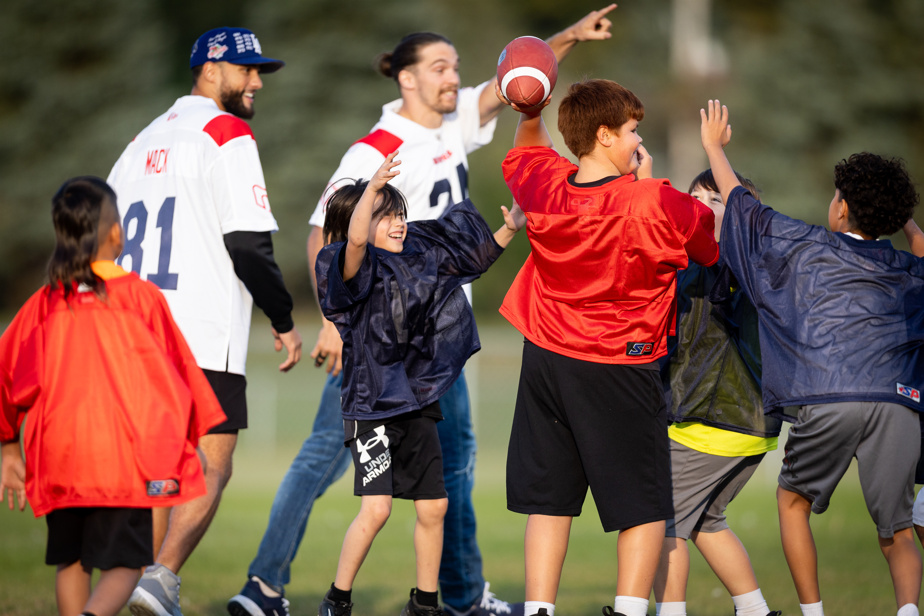It’s 5:45 p.m. in Kahnawake. The sun, until then bright, begins to disappear behind the forest surrounding the Sports Complex. Children in the community play football with four Alouettes. The young people shout, have fun and celebrate their touchdowns under the encouragement of the professionals, while their parents observe the scene, smiling, sitting in the stands.
Meanwhile, a few meters away, a seemingly innocuous scene takes place. A frank discussion between two men near the field. The two men are Mark Weightman, president of the Montreal Alouettes, and Mohawk leader Harry Rice.
In reality, this scene is the result of the initiative of the Montreal Alouettes, who came to meet the Mohawk community of Kahnawake as part of the National Day for Truth and Reconciliation, September 30. For the occasion, on Saturday, all CFL teams will wear orange jerseys during the warm-up period.
We don’t want to interrupt this meeting between two men from two very different backgrounds, who finally have the chance to talk to each other. After about twenty minutes, we finally got the chance.
“I told him how reconciliation is not just a word, it’s a feeling,” explains chef Harry Rice to La Presse. Putting our young people in contact with the Montreal Alouettes, in itself, is a form of reconciliation. »
“They haven’t done anything bad to our culture,” he adds, pointing to the players on the field. Neither do our children, obviously. But bringing them together is magical, it’s beautiful. Look at them, everyone is happy! »
And he’s right. Marc-Antoine Dequoy, Frédéric Chagnon, Austin Mack and Kaion Julien-Grant are up to their ears on the pitch. The children are having fun, as they should.
“We were talking about the progress that has been made in the last few years,” Weightman points out about his discussion with Rice.
He talks about what we recently learned about residential schools and unmarked graves. He deplores the fact that the history of the First Nations is practically not part of school curricula in Quebec.
“Fortunately or unfortunately, in this case, it is thanks to these discoveries that we are led to understand, to be made aware of this. This is the beginning of reconciliation.
“Everyone is of good will, and we want to contribute. But precisely, since we are not experts in the field, it can become awkward. And that’s what we were talking about. He said to me: “It doesn’t matter. It shows that the world wants to learn, wants to be more aware of what happened.” It was good to hear it. »
The idea for Wednesday’s meeting was proposed by the Alouettes. In addition to Saturday’s orange jerseys, the organization wanted to add a little “concrete” to achieve its “awareness objectives.”
“It’s the closest Indigenous community to Montreal, and it’s a very, very involved community in all sports,” explains Mark Weightman.
The news was received with great enthusiasm in the community.
“I was on vacation when I heard about it! says Harry Rice. I thought, “Wow, what a great initiative! We must not let this opportunity slip through our fingers.” »
Curren Jacobs and Helen Montour are two of three organizers of Kahnawake Orange Shirt Day. For them, this meeting between a “big Montreal organization” and their community, “that’s true reconciliation.”
“It’s a milestone,” says Jacobs. For a long time, outsiders were afraid to take the first step. So no matter what step we take, we are moving in the right direction. »
Chief Harry Rice and Helen Montour are both children of residential school survivors. What they see this Wednesday evening makes them “proud”.
“I’m filled with emotion,” Montour said. My father was in a boarding school. Thanks to his resilience, he was able to come home. Otherwise, I wouldn’t be here today. My nephew is over there [she points to the young people on the field], and he wouldn’t be here either. It’s awesome. »
She is happy to see young athletes in her community becoming “more and more active” athletically.
Frédéric Chagnon, linebacker for the Alouettes, is enthusiastic about sharing “the joys of sport” with the young people of Kahnawake.
We asked all the speakers we met on this balmy September evening: should sports organizations do more to raise awareness of Indigenous realities and recognize the importance of Truth and Reconciliation Day in the country?
Everyone recognizes that a first step like that of Wednesday will always be welcome. Marc-Antoine Dequoy goes a little further.
“If there’s one thing you can never say, it’s that you did too much,” says the Quebec defensive back. […] I think our part is to approach this by listening, by informing ourselves. On a sincere basis, things can only improve. »
And what do we hear when we listen while Alouettes players sign footballs, jerseys and caps?
A young girl can be heard shouting: “This is the happiest day of my life! »
